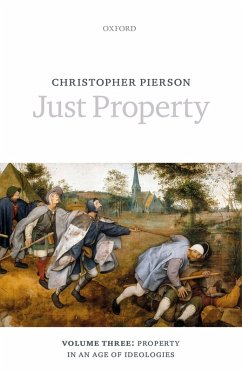This third and concluding volume of Just Property brings critical accounts of property right up to the present. The book is made up of five pairs of chapters located in five major ideological traditions of modernity: liberalism, libertarianism, social democracy, conservatism, and feminism. As before, the focus is on particular thinkers and their daring, puzzling and sometimes outrageous views. The concluding chapter returns to the project's opening questions about property and inequality and about property under the imperative of growth to limits. If we are to confront the enormous challenges that loom in front of us, we have, above all else, to think again, and quite radically, about the place of property in our collective lives.
Dieser Download kann aus rechtlichen Gründen nur mit Rechnungsadresse in A, B, BG, CY, CZ, D, DK, EW, E, FIN, F, GR, HR, H, IRL, I, LT, L, LR, M, NL, PL, P, R, S, SLO, SK ausgeliefert werden.


